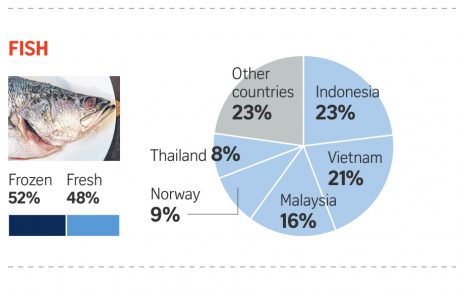The greatest long-term threat to countries in the Indo-Pacific comes from those who seek to undermine the rules-based international order, said at the yesterday, in an apparent reference to China.
As he unveiled details of the US strategy in the region amid , he warned of “actors” that “undermine the system by using indirect, incremental actions and rhetorical devices to exploit others economically and diplomatically, and coerce them militarily”.
“They destabilise the region, seeking to reorder its vibrant and diverse communities towards their exclusive advantage,” he said.
“If the trends in these behaviours continue, artificial features in the global commons could become toll booths. Sovereignty could become the purview of the powerful.”
Ties between the two major powers have been strained over trade and other issues such as the Taiwan Strait and South China Sea.
The US Defence Department yesterday also released a report on its Indo-Pacific strategy, which referred to China as a “revisionist power” seeking regional hegemony in the near term and global pre-eminence in the long term.
Mr Shanahan accused some actors of having deployed advanced weapons systems to militarise disputed areas, alluding to China’s military build-up in the South China Sea.
“When a country makes a pledge and does not follow it, you should worry. When that same country makes no pledge… You should really worry,” he said.
Making his first major speech since becoming the top US diplomat in January, he pledged the United States’ commitment to the region, describing it as its “priority theatre”.
But he urged allies and partners to invest in their own defence to strengthen deterrence and uphold a rules-based international order to maintain a level playing field.
Defence Minister Ng Eng Hen, making a similar point in answer to a question later, even as they try to resolve disputes through peaceful means.
He hosted a ministerial roundtable for the 22 visiting ministers and their representatives, including Mr Shanahan and Chinese Defence Minister Wei Fenghe.
General Wei is expected to respond to the US strategy in his speech today at the Shangri-La Dialogue, which has gathered ministers and defence chiefs from around the world each year since 2002.
France yesterday also outlined its own Indo-Pacific strategy, with its Defence Minister Florence Parly pledging that her country would continue to sail more than twice a year in the South China Sea, and would not be going anywhere as it was part of the region.
In his speech, Mr Shanahan also spoke of cooperation with China, saying that it has stood with the US and other countries in pursuit of shared goals such as regional security and stability, and also against imperialism, fascism and Soviet domination in the past.
“I say now that China could still have a cooperative relationship with the United States,” he added.
He said the US will cooperate with China where there is an alignment of interests and compete where necessary, though “competition does not mean conflict”.
“Competition is not to be feared. We should welcome it, provided that everyone plays by internationally established rules. China can and should have a cooperative relationship with the rest of the region, too,” said Mr Shanahan.
But he added that “behaviour that erodes other nations’ sovereignty and sows distrust of China’s intentions must end”.
Speaking to The Sunday Times yesterday, China’s Lieutenant-General He Lei took issue with Mr Shanahan’s remarks on Taiwan and the South China Sea.
Pointing to how the US had pulled out of the Trans-Pacific Partnership trade pact and the Paris Agreement on climate change, he said the US had itself undermined the rules-based international order and had no moral authority to point fingers at others.



